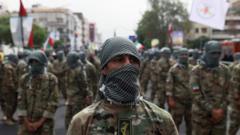Recent court documents reveal a disturbing trend linking Iran's Revolutionary Guards to rising plots to assassinate dissidents abroad, including a noted incident involving organized crime figures.
Iran's Covert Assassination Schemes: Criminal Gangs as Agents

Iran's Covert Assassination Schemes: Criminal Gangs as Agents
Iran is reportedly utilizing criminal organizations for foreign targeted killings, according to intelligence investigations.
In what appears to be a systematic approach to eliminate political opponents and perceived threats, Iranian authorities have increasingly resorted to hiring criminal gangs for covert operations outside the country. Investigations by Western intelligence agencies indicate that the Iranian regime, particularly the elite Islamic Revolutionary Guard Corps (IRGC), has intensified its efforts to kidnap or assassinate individuals such as journalists, activists, and defectors since 2022.
One of the primary actors identified in these operations is Naji Sharifi Zindashti, a notorious criminal involved in drug trafficking with a history that leads back to Iran. Court documents from Turkey and the US make linked him to a series of high-profile assassinations, including that of Saeed Karimian, a media figure seen as a threat to Tehran’s ideology.
Zindashti's alleged criminal activities are embedded in a pattern of violence that correlates with Iran's political agenda—his connections to organized crime are not merely incidental but appear to be strategically utilized by the IRGC to carry out hits without direct ties to the government. His involvement raises significant questions about how deep the collaboration between Iran's intelligence apparatus and organized crime networks runs.
In 2020, he was implicated in the disappearance of Iranian dissident Habib Chaab, whose abduction was publicly pushed by Iranian state media following his capture. More recently, FBI documents refer to Zindashti's alleged attempts to orchestrate the assassination of Iranian defectors in the US. Law enforcement agencies have also intervened to thwart plots against high-profile individuals linked to past US administration members.
Interestingly, the collaboration appears to extend to international criminal groups such as the Thieves-in-Law, a gang with Russian origins. Their joint operations highlight a greater strategy of equipping the IRGC with the necessary means to enact foreign operations without direct involvement, raising concerns among international observers of the regime's reach.
In response to this growing threat, both the US and UK have enacted sanctions aimed at curbing the IRGC's activities abroad, targeting key individuals involved in these operations, including Zindashti himself. Moreover, recent investigations reveal an alarming uptick in credible threats against individuals in the UK allegedly linked to Iranian intelligence.
As police and intelligence agencies work to disrupt these criminal networks, the connections between Iran's intelligence services and organized crime are evident. This tactic of "creeping penetration," as described by UK officials, underscores a calculated attempt by the Iranian regime to maintain plausible deniability while still executing its perilous plans abroad.
One of the primary actors identified in these operations is Naji Sharifi Zindashti, a notorious criminal involved in drug trafficking with a history that leads back to Iran. Court documents from Turkey and the US make linked him to a series of high-profile assassinations, including that of Saeed Karimian, a media figure seen as a threat to Tehran’s ideology.
Zindashti's alleged criminal activities are embedded in a pattern of violence that correlates with Iran's political agenda—his connections to organized crime are not merely incidental but appear to be strategically utilized by the IRGC to carry out hits without direct ties to the government. His involvement raises significant questions about how deep the collaboration between Iran's intelligence apparatus and organized crime networks runs.
In 2020, he was implicated in the disappearance of Iranian dissident Habib Chaab, whose abduction was publicly pushed by Iranian state media following his capture. More recently, FBI documents refer to Zindashti's alleged attempts to orchestrate the assassination of Iranian defectors in the US. Law enforcement agencies have also intervened to thwart plots against high-profile individuals linked to past US administration members.
Interestingly, the collaboration appears to extend to international criminal groups such as the Thieves-in-Law, a gang with Russian origins. Their joint operations highlight a greater strategy of equipping the IRGC with the necessary means to enact foreign operations without direct involvement, raising concerns among international observers of the regime's reach.
In response to this growing threat, both the US and UK have enacted sanctions aimed at curbing the IRGC's activities abroad, targeting key individuals involved in these operations, including Zindashti himself. Moreover, recent investigations reveal an alarming uptick in credible threats against individuals in the UK allegedly linked to Iranian intelligence.
As police and intelligence agencies work to disrupt these criminal networks, the connections between Iran's intelligence services and organized crime are evident. This tactic of "creeping penetration," as described by UK officials, underscores a calculated attempt by the Iranian regime to maintain plausible deniability while still executing its perilous plans abroad.




















